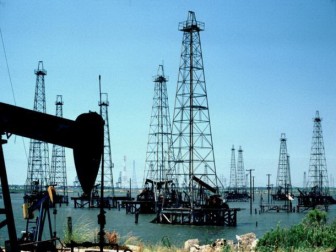 By Ramya Venugopal and Rebekah Kebede
By Ramya Venugopal and Rebekah Kebede
SINGAPORE (Reuters) – Brent crude edged above $106 per barrel on Monday as a more than 2 percent drop in the previous session attracted some buyers, although investors remained focused on the U.S. presidential elections and demand worries.
A waiver by the U.S. government allowing foreign tankers to bring fuel to the East Coast to tide over shortages caused by superstorm Sandy pulled crude futures sharply lower on Friday following mostly rangebound trade last week.
“What we’re seeing is buying on dips after the selloff on Friday, otherwise the market is generally cautious, waiting for the outcome of the U.S. elections and to see Sandy’s influence on the oil markets and on U.S. stockpile levels,” said Natalie Rampono, commodity strategist at ANZ.
President Barack Obama and Republican challenger Mitt Romney are locked in a close race, as global markets worry about U.S. budget uncertainty, with looming spending cuts and tax hikes threatening to push the economy back into recession.
Front-month Brent futures were trading up 23 cents at $105.91 per barrel at 0718 GMT after rising to $106.20, while U.S. crude climbed 26 cents to $85.12 per barrel.
ELECTIONS
Markets are now bracing for the outcome of U.S. elections and a once-in-a decade power change in China – the world’s top two economies as well as the two biggest oil consumers – for further trading cues.
This comes at a time when crude markets are already weighed down by worries of weak demand, especially in key consumers such as Japan, China and the euro zone, with a ramp-up in production by Saudi Arabia adding to pressure.
The outcome of Congress talks over the ‘fiscal cliff’ – a package of tax increases and spending cuts that will take effect in January if there is no long-term pact to cut the U.S. budget deficit – is already a major uncertainty for markets.
“Broadly speaking, we’ve seen a process over recent weeks now where the oil market is adjusting for the fact that there’s plenty of supply around for current demand levels,” said CMC markets analyst Ric Spooner.
He added that a key concern over the U.S. election was the possibility of a narrow Obama victory combined with a convincing Republican win in Congress, which would make negotiations to fix the fiscal cliff difficult.
Last year’s bitter partisan fight in Congress over raising the debt ceiling, the legal amount the U.S. Treasury is allowed to borrow, resulted in the United States losing its coveted top-tier triple-A rating from Standard & Poor’s.
Failure to find a speedy solution to the fiscal cliff could push the world’s biggest economy into a deep recession and cut energy demand far more than expected.
Adding to concerns, two days after the U.S. elections, China’s ruling Communist party will begin its once-in-a-decade power shift.
Demand worries persisted, despite data last week that pointed to a sustained improvement Asia, as analysts remained unconvinced about a recovery in the United States and China, which are essential for a global turnaround.
Manufacturing in the euro zone shrunk for a 15th straight month, increasing doubts about a global recovery. France, Spain and Italy and Spain saw a continuing trend of sharp decreases in fuel use, but Germany and Britain saw growth, statistics showed last week. (Editing by Joseph Radford and Himani Sarkar)
Source: Reuters



























